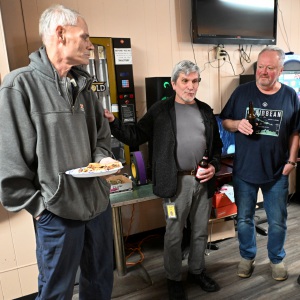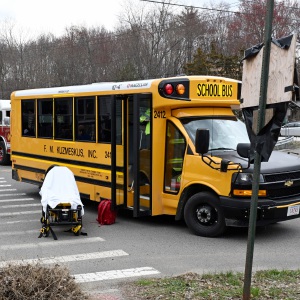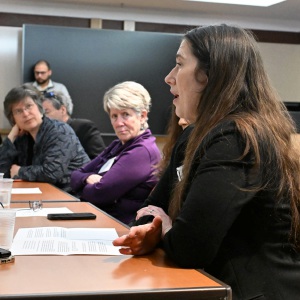Gill-Montague District loses funding for after-school program

Sheffield Elementary School FILE PHOTO
| Published: 08-31-2024 11:23 PM |
GILL – The Gill-Montague Regional School District (GMRSD) was notified in early August that Sheffield Elementary School would no longer receive funding for an after-school program through its partnership with the Collaborative for Educational Services (CES).
During a School Committee meeting on Tuesday, Aug. 20, GMRSD Superintendent Brian Beck spoke candidly about the loss of the program. He stated that he was notified that Sheffield did not meet the criteria for the 21st Century After School Program two weeks before the start of the school year. Funding comes from the Department of Elementary and Secondary Education (DESE).
In a follow-up conversation, Beck said the district has worked with CES for several years for after-school programming. Upon learning the funding would not be granted for the coming school year, Beck ran into communication delays with CES as to whether or not the funding was officially unavailable. He was notified by CES Executive Director Todd Gazda that Sheffield did not meet the requirements for the program, and thus did not receive the funding.
“[Gazda] then went to the Department of Education to see if there was any possibility of getting us back into the grant,” Beck said. “The DESE had informed him that all those deadlines had passed, and that we would not be able to get back into the grant for this upcoming school year, but that we could apply for the following year.”
Beck explained that earlier this year, an evaluation of the program was done by DESE. This looked at the program’s performance, and DESE determined it did not meet the requirements for continued funding based on a points system developed for the evaluation.
“[DESE] sends folks out to evaluate the effectiveness of the programs, and what they didn't inform us of is that the ratings used would be used within an established threshold score of 70… in order to have funding continue, would need to have earned 70 points on that rating scale, and we earned 68.5,” Beck said.
On the DESE website, a breakdown of the grant program eligibility requirements is available, but a points system used in evaluations is not accessible in the list of publicly available resources. The after school programs available are described by CES as enrichment opportunities after the regular school day ends. Students are fed, given homework assistance and have the chance to participate in extra activities. These programs also allow for parents and guardians to keep their kids in a monitored setting until they can pick them up later in the day.
When asked, CES Deputy Director Karen Reuter explained grant eligibility is determined based on factors such as income and community demographics by DESE.
Article continues after...
Yesterday's Most Read Articles
 Report: Montague Police internal affairs investigation ‘biased’
Report: Montague Police internal affairs investigation ‘biased’
 Laid-off Kennametal employees ponder what’s next
Laid-off Kennametal employees ponder what’s next
 Greenfield native Sam Calagione, founder of Dogfish Head Brewery, to throw out first pitch at Fenway Park on Friday
Greenfield native Sam Calagione, founder of Dogfish Head Brewery, to throw out first pitch at Fenway Park on Friday
 My Turn: Call us Cinderella Town
My Turn: Call us Cinderella Town
 Springfield man held without bail in case of September foot pursuit in Greenfield
Springfield man held without bail in case of September foot pursuit in Greenfield
 Real Estate Transactions: April 18, 2025
Real Estate Transactions: April 18, 2025
“There are only certain communities that are eligible, and the eligibility is determined by the demographic need, often in terms of income levels,” Reuter said. She explained that, “DESE is trying to target these resources to the communities that need additional resources in order to give additional support to students who need it, both from a social-emotional perspective, from an academic and from an activity level perspective.”
Reuter explained that the grant program through DESE is highly competitive, so if a school does not meet the eligibility standard for that school year, the funding will not be offered. However, schools can reapply each year for the grant, even if they did not benefit from it in the year prior.
Although these eligibility parameters were shared by Reuter, further detail on how they are measured and scored within a district were not. Beck explained that detailed information on the necessary criteria for eligibility and how it’s measured was not provided ahead of DESE evaluations.
Both the communication delay and funding loss have left little time between now and the start of the school year for setting up a temporary after-school program. Beck said that he has contacted Montague Town Administrator Walter Ramsey to see if the town can offer any resources to supplement the program.
Bernardston Elementary School has faced a similar situation. The Berardston Recreation Department stepped in to host an after-school club after both the Pioneer Valley Regional School District chose to step away from its contract with CES due to financial constraints, along with participation levels in the program.
According to the CES website, the program currently partners with the Franklin County schools of Dexter Park Elementary School, Greenfield High School and Mahar Regional High School. DESE released a list of the districts who received the 21st Century Community Learning Grant during the 2024 fiscal year, of which Sheffield was included.
In the past, Beck reports 65 students have been enrolled for after-school care through CES, and he is in the process of researching options for students and families who would typically use the program.
“I'm just hopeful that we'll be able to get something going and get through the year, and we'll be hopeful that [CES] will look toward applying for us for the years to come,” Beck said.
Erin-Leigh Hoffman can be reached at ehoffman@recorder.com or 413-930- 4231.






 Expanding child care options: Hilltown Children’s Center opens in Shelburne
Expanding child care options: Hilltown Children’s Center opens in Shelburne ‘Courage, not acquiescence’: McGovern encourages increased engagement during Trump administration
‘Courage, not acquiescence’: McGovern encourages increased engagement during Trump administration Vehicle collides with school bus causing minor injuries in Montague City
Vehicle collides with school bus causing minor injuries in Montague City AG pledges to help fight opioid crisis in visit to Greenfield
AG pledges to help fight opioid crisis in visit to Greenfield
